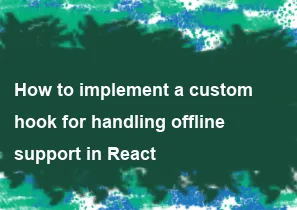How to implement a custom hook for handling offline support in React

Implementing a custom hook for handling offline support in a React application involves using the navigator.onLine API to check the online status and subscribing to events such as online and offline to update the online status in real-time. Here's how you can create such a hook:
jsximport { useEffect, useState } from 'react';
const useOfflineSupport = () => {
const [isOnline, setIsOnline] = useState(navigator.onLine);
useEffect(() => {
const handleOnline = () => {
setIsOnline(true);
};
const handleOffline = () => {
setIsOnline(false);
};
window.addEventListener('online', handleOnline);
window.addEventListener('offline', handleOffline);
return () => {
window.removeEventListener('online', handleOnline);
window.removeEventListener('offline', handleOffline);
};
}, []);
return isOnline;
};
export default useOfflineSupport;
In this custom hook:
- We use the
useStatehook to manage the online status (isOnline). - We use the
useEffecthook to subscribe to theonlineandofflineevents when the component mounts. These events are triggered when the browser's online status changes. - When the component unmounts, we clean up by removing the event listeners.
- The hook returns the current online status (
isOnline), which components can use to conditionally render content or perform actions based on the online status.
You can use this custom hook in your components like this:
jsximport React from 'react';
import useOfflineSupport from './useOfflineSupport';
const MyComponent = () => {
const isOnline = useOfflineSupport();
return (
<div>
<h1>{isOnline ? 'Online' : 'Offline'}</h1>
</div>
);
};
export default MyComponent;
With this custom hook, your React components can easily handle offline support by reacting to changes in the online status and adapting their behavior accordingly. Adjust the hook and component logic as needed for your specific offline support requirements.
-
Popular Post
- How to optimize for Google's About This Result feature for local businesses
- How to implement multi-language support in an Express.js application
- How to handle and optimize for changes in mobile search behavior
- How to handle CORS in a Node.js application
- How to use Vue.js with a UI framework (e.g., Vuetify, Element UI)
- How to configure Laravel Telescope for monitoring and profiling API requests
- How to create a command-line tool using the Commander.js library in Node.js
- How to implement code splitting in a React.js application
- How to use the AWS SDK for Node.js to interact with various AWS services
- How to use the Node.js Stream API for efficient data processing
- How to implement a cookie parser middleware in Node.js
- How to implement WebSockets for real-time communication in React
-
Latest Post
- How to implement a dynamic form with dynamic field styling based on user input in Next.js
- How to create a custom hook for handling user interactions with the browser's device motion in Next.js
- How to create a custom hook for handling user interactions with the browser's battery status in Next.js
- How to implement a dynamic form with dynamic field visibility based on user input in Next.js
- How to implement a dynamic form with real-time collaboration features in Next.js
- How to create a custom hook for handling user interactions with the browser's media devices in Next.js
- How to use the useSWRInfinite hook for paginating data with a custom loading indicator in Next.js
- How to create a custom hook for handling user interactions with the browser's network status in Next.js
- How to create a custom hook for handling user interactions with the browser's location in Next.js
- How to implement a dynamic form with multi-language support in Next.js
- How to create a custom hook for handling user interactions with the browser's ambient light sensor in Next.js
- How to use the useHover hook for creating interactive image zoom effects in Next.js